|
|
Home →
Survival →
Fire →
Tinder
Wad Tinders
by
Allan "Bow" Beauchamp
Text & Photos by
Allan "Bow" Beauchamp |
|
|
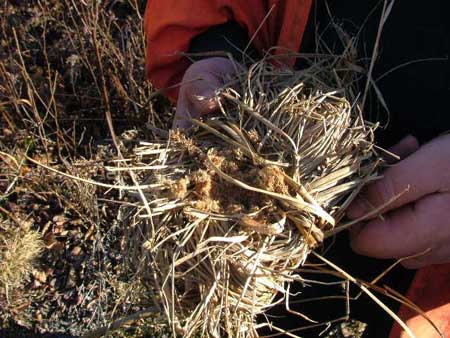 |
This is a firearm fire starter.
I have many ways to use these systems, I'll depict this one...
Here I've taken dried grass and some bulrush seeds and made a donut of
sorts from the grass and used a bulrush stalk to bind it all together.
Then with the top section of the bulrush I've tucked the seeds into this
center area. |
|
|
|
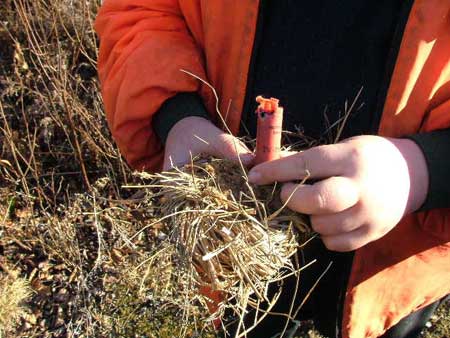 |
Now, with a 12 gauge shell, I have opened it and sorted
out the components.
|
|
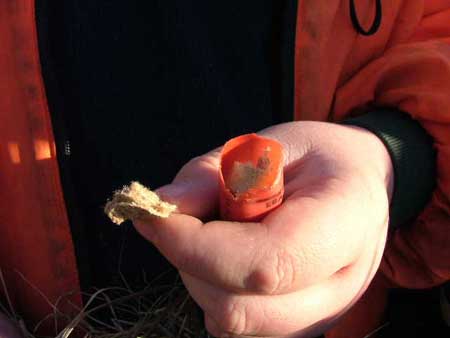 |
Seen here is a wad section from the inside of the shell
underneath the pellets. This section (on this shell) is between the
pellets and the powder.
|
|
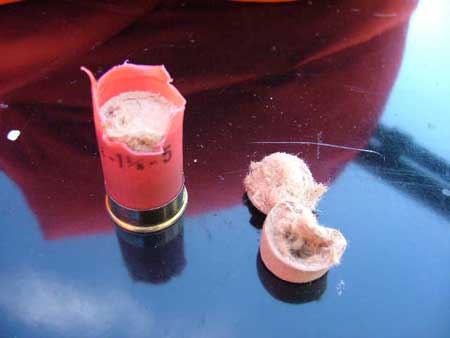 |
As you can see, there is a lot of this wadding. Could we
use this wadding for tinder? |
|
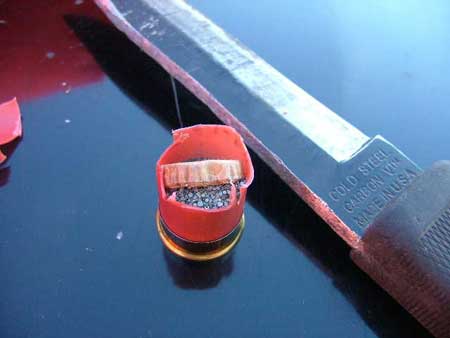 |
Our last layer seen here is a cardboard cap of sorts, and
under this cap is our powder. |
|
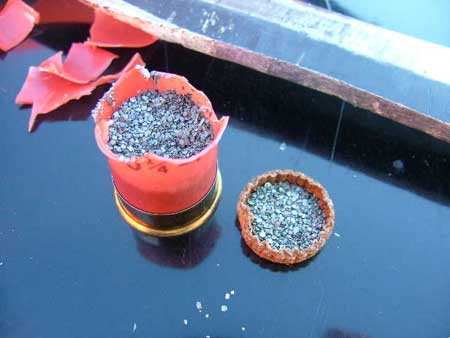 |
I take a small amount of powder in this cap, and then
place it inside my tinder bundle. |
|
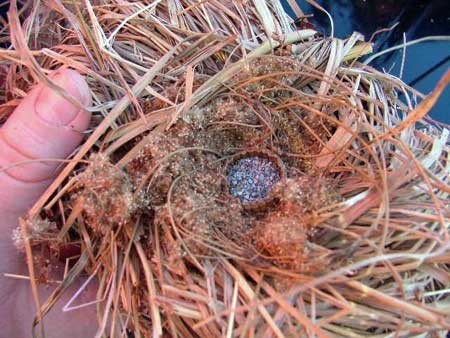 |
This is how I will place this small amount
of powder. |
|
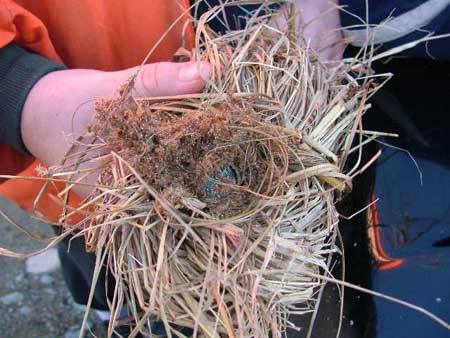 |
At this point my preference is to place the rest of my
covering in fine, soft, easy-to-light tinder, in this case some more of
my bulrush tops. This makes for an easy tinder starter, and the
materials around will add a good second layer of tinder.
This system works in stages as do all tinder bundles. |
|
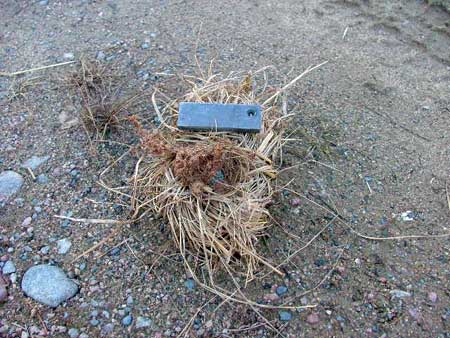 |
The total system:
knife, a flint stick, and my tinder bundle complete with powder.
Now, is there any advantage to this as opposed to using my flint stick?
Why not just use the flint stick?
Some insights here ...
It has rained for two days, and it is getting cold! |
|
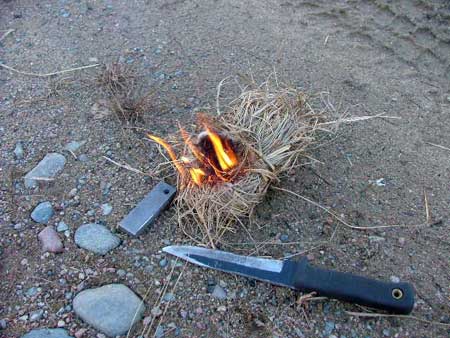 |
This system seems to work well: it got this fire going...
Do you think this system would have been easy to light or hard to light?
The materials we used were grass, and bulrush...
|
|
|
Let's analyze this, shall we: It's wet, as it has rained for two days,
and it is turning cold, so this effects our fire triangle. And any wet
will stay with the materials as there is no heat to dry it out!!
Bulrush, our tinder choice, is usually found near a wet area!! And
this place I stopped was exactly that -- wet and swampy low land!
As we all know "heat" is a big factor when trying to start a fire,
and since we've had a lot of wet and cold, the dampness is still in the
air here.
If we have to make it work the first time this is a great option.
Be assured it will work with all these variables in this equation.
I have many ways of doing the same thing, for just this reason: no
two days or areas offer the same fire starting options, so we must
endeavor to learn and practice with all materials available to us; good
sound fire starting skills.
When you first viewed the picture of the tinder bundle, how many of
you thought we would just use the flint and it would work just as easy?
If so, then please see the next picture! |
|
|
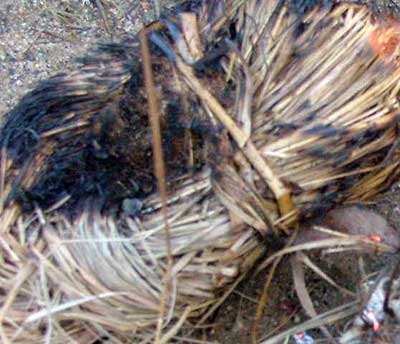 |
In this picture please note the remains of an attempt of
doing just a flint on this (for those who thought using just a flint
would work). It did indeed start but soon my tinder burnt
slow as it was too moisture laden. Adding more tinder at this stage was
really not much help, as it would burn slowly. There is a
variety of tinder in this area. However, I wanted to stay close to where
these products were (an honest try of sorts!). |
|
|
I could have broken the tinder down more and tried to make it finer, but I
felt this would have just made it burn out even quicker. In this
picture you see my grass donut, and it is still in the coarse stage. I
had for this attempt shredded some to assist my tinder. But this all
burnt slow as can be seen in the forefront of my picture seen (above).
As I said, it has rained for two days, and is getting cold.
It is true, however, that I could have mixed many forms of tinder to
assist this, but what I am trying to demonstrate here is that I am using
what is right here in this spot where I find myself! As many times I
have found myself needing a fire, and having available only what I can
find in the immediate area. This is, by the way, a good way to hone and
perfect your fire-making skills -- pick a small area, restrict yourself
to that area, and try to make a fire from just what you find in that
area!
I have been asked about the wadding from the shell for tinder. What I
found was that you can fray it up a lot, and try and make it catch a
spark like a small tinder bundle, but this doesn't work. For if it did,
when you shot your shells off you'd have little tinder bundles flying
everywhere! But, perhaps I'm wrong!
I hope this offers the hunters viewing this some new insights! |
|
|
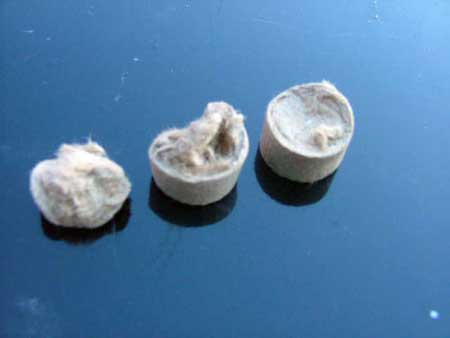 |
Seen here in this picture is the wadding in three stages
of what I did to increase my chances of lighting it with a flint.
I had tried to make it as fine as possible, however it was not a good
choice. These are just my findings of course. You may
discover something different! |
|
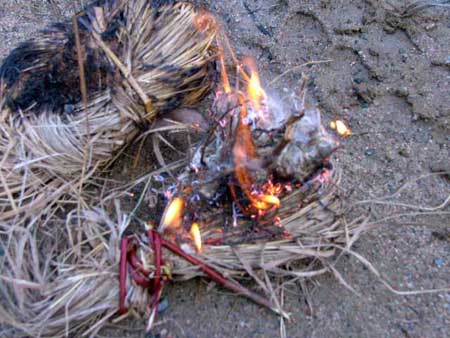 |
In this area, if one mixed various tinder materials and
fine-tuned the system seen here, it would be a good option for the flint
stick. But as I had mentioned earlier, there isn't always
a good mixture of tinder materials available, so one should develop good
sound fire starting "options". If you have materials
available that will increase your chances of making it work the first
time, or increase the heat substantially, try them and learn from them.
But above all, practice. Good luck and have fun! |
|
|
|
|
|